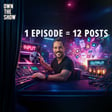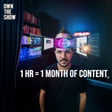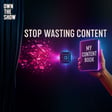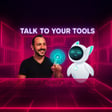
Ai as Podcast Producer To Cut The Work In Half
Welcome to the latest episode of "Ai Microskills" with your host, Dan Sanchez. In this episode, Dan interviews Susan Diaz, an expert in leveraging AI for coaching, consulting, and time management. They delve into the world of AI and its application to enhance podcasts, discussing the potential of ChatGPT for guest sourcing, scheduling, and post-production distribution. Throughout the conversation, they explore the use of AI in processing and analyzing podcast clips, and anticipate future advancements in AI for podcasting, such as automated production and distribution. Susan shares valuable insights into her preferred tech stack for recording and editing, while Dan expresses interest in implementing AI into his podcast process. Stay tuned as they discuss the transforming landscape of AI in podcasting and the potential of custom GPTs for podcast research. This episode is packed with actionable insights for marketers looking to harness the power of AI in their podcasting journey.
Timestamps:
04:01 Seeking human connections for AI and marketing.
08:44 Injecting fun and controversial content into interviews.
10:12 Improving communication and planning for interactions.
12:56 Preferring cloud for processing larger volumes efficiently.
18:08 Comparing different tools for transcribing audio content.
19:26 Automate scheduling and posting podcast content efficiently.
23:01 Seeking efficient time management through ChatGPT.
26:26 Custom GPT generates content based on research.
30:07 Refinement and innovation in editing technology expected.
34:16 Exciting future with improved AI video analysis.
36:16 Justin Feinberg and team provide valuable automation resources.
Love these show notes? They're made by Ai with CastMagic. Find out how to automate your show notes and more here: https://aimicroskills.com/castmagic




![What’s Your Authority Score? [The 5-Factor Test] image](https://media.zencastr.com/cdn-cgi/image/width=112,quality=85/image-files/630c9f06819f8b3dba5fa460/cfbaccba-f587-45de-a41f-e2c99c15e2a5.png)
![The Audience Growth Engine [Full Framework] image](https://media.zencastr.com/cdn-cgi/image/width=112,quality=85/image-files/630c9f06819f8b3dba5fa460/46b84fd1-e856-4687-9aee-6b4a7e0bc7ff.png)



![The "Dream 100" Execution Plan [Google Sheet System] image](https://media.zencastr.com/cdn-cgi/image/width=112,quality=85/image-files/630c9f06819f8b3dba5fa460/fcd89374-76a4-4e58-a2e3-2bb7ddda4364.png)









